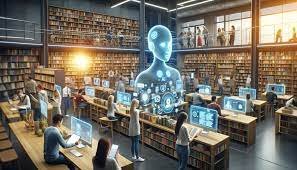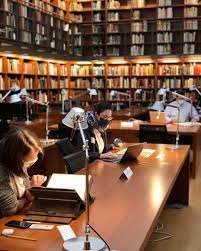
LIBRARY 02is a trove of knowledge, culture, and history, serving as a vital resources for communities around the world. It is more than just a building filled with books ;it is a dynamic space that fosters learning, creativity, and social interaction. In this essay, we will explore the various aspects of libraries, including their history, functions, and the impact they have on society.
The role of libraries in society is multifaceted and essential for the developement of individuals and communities. Libraries serve as repositiories of knowledge , centers for learning , and spaces for community engagement.
1.INTODUCTION TO LIBRARIES:
“Libraries have existed for thousands of years, evolving from ancient collections of clay tablets and scrolls to modern digital repositories of information. They are places where individuals can access a wealth of resources, from books and magazines to digital content and databases.“
Table of Contents
- 1.INTODUCTION TO LIBRARIES:
- “Libraries have existed for thousands of years, evolving from ancient collections of clay tablets and scrolls to modern digital repositories of information. They are places where individuals can access a wealth of resources, from books and magazines to digital content and databases.”
- ALAS !THE SANCTUARY OF KNOWLEDGE:THE INDURING SIGNIFICANCE OF LIBRARIES
ALAS !THE SANCTUARY OF KNOWLEDGE:THE INDURING SIGNIFICANCE OF LIBRARIES

2. A BRIEF HISTORY OF LIBRARIES:
Libraries have a rich history dating back to ancient civilizations. The library of ASHURBANIPAL (7th century BC) and the Great Library of ALEXANDRIA (3rd century BC) were renowned repositories of knowledge. These early libraries housed presious manuscripts, scrolls,and texts, safeguarding humanity's collective wisdom.
3.THE HEART OF EDUCATION:
Libraries serve as the nucleus of educational institutions, providing students with unfettered access to information. They foster a culture of learning, encouraging exploration,critical thinking ,and intellectual curiosity. Librarians facilities research, recommend resources, and nature a <a href="https://vox.divinity.edu.au/wp-content/uploads/2020/04/library-shelf-740×407.jpg" data-type="link" data-id="7love for reading

4.BEYOND BOOKS :MODERN LIBRARY RESOURCES:
Modern libraries transcend traditional boundaries, incorporating diverse resources and technologies:
- Digital collections and online databases
- Audio-visuals materials and multimedia resources
- Collaborative workspaces and study areas
- Community programs, workspaces, and events

5.HUBS OF COMMUNITY ENGAGEMENT:
Libraries have envolved into vibrant community centers, hosting:
- Author readings ,books,clubs and literary festivals
- Art exhibitions, concerts ,and cultural
- Children’s story time, summer reading programs and youth activities
- Public lectures, workshops and professional development seminars
6.INCLUSIVITY AND ACCESSIBILITY :
. Libraries champion inclusivity, providing:
- Accessible materials for visually impaired patrons
- Multilingual resources and language learning tools
- Safe spaces for marginalized communities
- Digital literacy programs and technology training
7.CHALLANGES AND OPPORTUNITES IN THE DIGITAL AGE:
Libraries face contemporary challanges:
- Digitalization and information overload
- Funding constraints and budget cuts
- Evolving user expectations and technological advancements
Yet, these challanges also present opportunites for innovation:
8.THE FUTURE OF LIBRARIES:
As society continues to evolve, libraries will:
- Adept to emerging technolgies and user needs
- Strengthen community ties and partnerships
- Preserve cultural heritage and collective knowledge

9.PROMOTING LITERACY AND EDUCATION:
Libraries play a vital role in promoting literacy and education at all levels .They offer programs and resources for children , teens ,and adults, helping to cultivate a love for reading and learning. Story time sessions for young children , homework help for students ,and adult literacy programs are a just a few examples of how libraries support education. Additionally, libraries often collaborate with schools and educational institutions to enhance learning opportunities for students.

10.RESEARCH SUPPORT:
For students ,academic, and researchers ,libraries provide invaluable support in conducting research .Libraries are trained professionals who can assist patrons in navigating complex information systems, locating credible sources, and developing effective research strategies. Libraries often offer access to specialized databases, academic journals ,and refrences materials that are essential for in depth -research. This support is critical academic success and intellectual growth.
11.SUPPORTING MENTAL HEALTH:
Libraries can also play arole in supporting mental health and well-being. They provide a quiet and peaceful environment for individuals seeking solitude, reflection, or a break from daily stressors. Many libraries offer programs focused on mental health awearness,providing resources and support for these in need. By promoting mental well-being ,libraries contribute to the overall health of the community.

12.DIGITAL LITERACY:
In today's digital age, libraries play a crucial role in promoting digital literacy . They provide access to computers , the internet , and various digital resources , helping individuals develop essential technology skills. Many libraries offer classes on computer usage , internet safety , and software application ,empowering patrons to navigate the digital world confidently . This access is especially important for those who may not have reliable internet access at home , ensuring that everyone can participate in the digital economy.
Many libraries are embracing the role of innovation and creativity centers. They offer makerspaces ,where individuals can experiment with technology ,art and craft . These spaces often include tools like 3d printers.
13. CONCLUSION:
In Conclusion , Libraries serve a vital role in society by providing access to information , promoting literacy and education , fostering community engagement , supporting digital literacy , preserving cultural heritage , assisting with research , fostering innovation , and supporting mental health . As society continues to evolve , libraries must adept to meet the changing needs of their communities . By doing so , they will remain essential institutions that empower individuals , enrich communities , and promote a culture of learning and growth for all.
Libraries remain indispensible cornerstones of modern society , upholding the values of knowledge inclusivity , and community . As we navigate the complexities of the digital age , these sanctuaries of learning will continue to illuminate the path to understanding , empowerment , and enlightenment .

